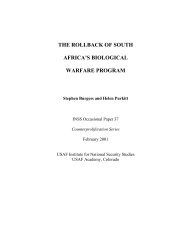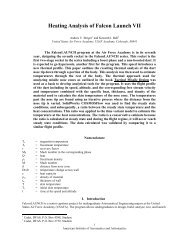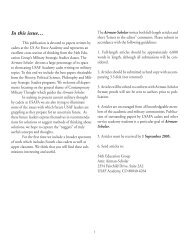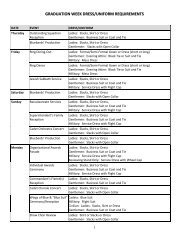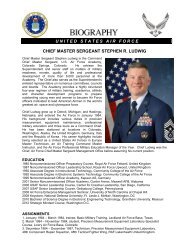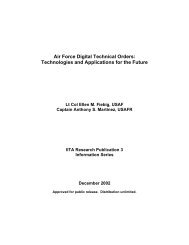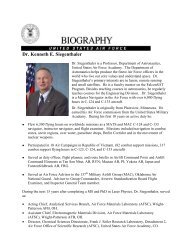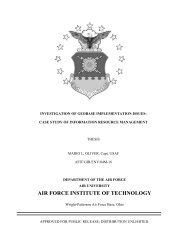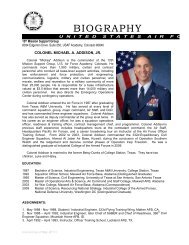Military Professionalism - United States Air Force Academy
Military Professionalism - United States Air Force Academy
Military Professionalism - United States Air Force Academy
You also want an ePaper? Increase the reach of your titles
YUMPU automatically turns print PDFs into web optimized ePapers that Google loves.
O’Keefe, Ed. “Fate of ‘Don’t Ask, Don’t Tell’ Ban Is Still Being Debated.” The<br />
Washington Post (Sept. 23, 2010).<br />
http://www.washingtonpost.com/wpdyn/content/article/2010/09/22/AR2010092205696.html<br />
On Sept. 21, 2010, the FY11 Defense Authorization Bill, which contained an amendment<br />
repealing “don’t ask, don’t tell” was voted down. A district judge in California ruled that<br />
“don’t ask, don’t tell” is a violation of the First Amendment and gave the federal<br />
government until Thursday to appeal. Multiple homosexuals who were discharged on<br />
this ground are arguing to be reinstated, claiming that homosexuals should not be<br />
discharged unless it is necessary to further military goals.<br />
Patti, Chris. “The <strong>Military</strong>’s Next Step After ‘Don’t Ask, Don’t Tell’: Equal Rights<br />
for Gay Service Members.” The Washington Post (Dec. 30, 2010).<br />
http://www.washingtonpost.com/wpdyn/content/article/2010/12/30/AR2010123003464.html<br />
Patti, who is retired from the Navy, says that the Pentagon must be clear about treating all<br />
members of the U.S. military equally, which means that it must recognize gay marriage<br />
as legal and a right of every soldier, sailor, airman and Marine. Patti believes that these<br />
rights almost must extend to their spouses, just as they do to the spouses of straight<br />
servicemen and women, to include health care, retirement benefits, GI Bill eligibility and<br />
commissary privileges.<br />
RAND Corporation. Changing the Policy Toward Homosexuals in the U.S. <strong>Military</strong>.<br />
Santa Monica: Rand Corporation, 2000.<br />
http://www.rand.org/pubs/research_briefs/RB7537.html<br />
The manner in which “don’t ask, don’t tell” policy change is implemented is likely to<br />
determine whether it is accepted with minimal disruptions. Based on a review of<br />
organization theory, implementation research, and the military's own experience with<br />
racial integration, the study team identified several key elements of an implementation<br />
strategy: the policy change must be communicated clearly and consistently from the top;<br />
the policy selected should be implemented immediately; emphasis should be placed on<br />
conduct, not on teaching tolerance or sensitivity; leadership must send messages of<br />
reassurance to the force; leaders at all levels should be empowered to implement the<br />
policy; and a monitoring process should be established to identify any problems early in<br />
the implementation process and address them immediately.<br />
57




